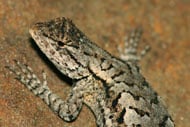Eastern Fence Lizard
Southern half of the U.S. except the far west
Eastern fence lizards earned their common name by being conspicuous daytime baskers on the tops of fence posts and other promontories. Eastern fence lizards seek these places so they can safely soak up the rays of the sun each day and also have a great vantage point to watch for and pounce down upon their main food, insects, and also to keep a watchful eye open for approaching danger.
The many races are all basically shades of grey with patterns of stripes, spots or chevrons in black. Their scales end in spines which give them rough appearances, but those spines are too small to cause injury to human hands. Don’t handle eastern fence lizards by their tails they break off easily and wiggle for several minutes as a defensive strategy to confuse predators.
Set up eastern fence lizards on sand or soil with several braches or logs of pine to climb upon. Only one male female pair should be housed in one cage because males are prone to fighting. Male eastern fence lizards have brightly colored underbellies, often with blue. This has resulted in a second common name ‘bluebellies.’

